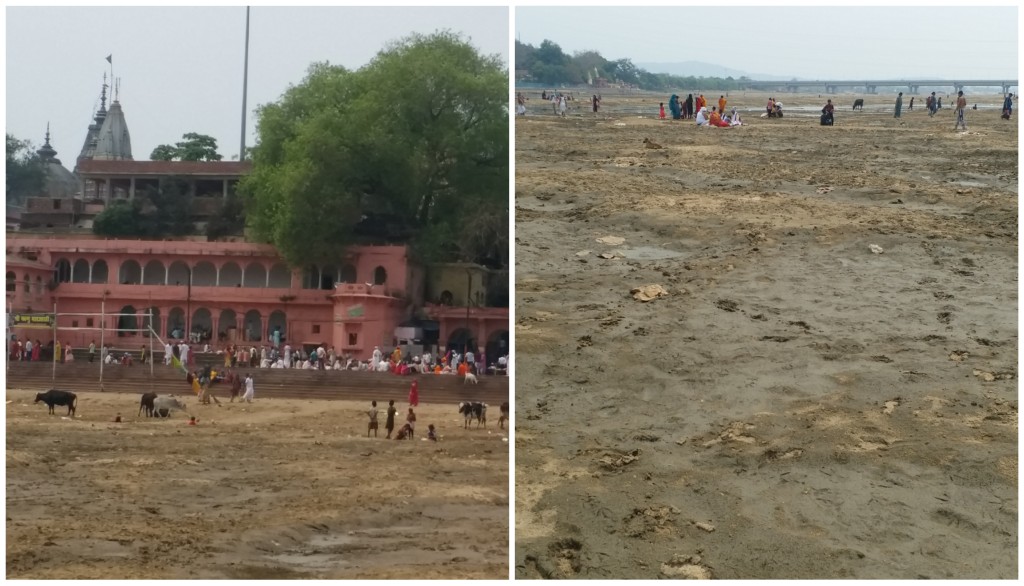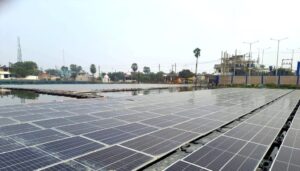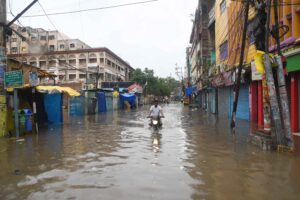Gaya’s Rs 324 Crore Rubber Dam Dries Up, Forcing Pilgrims to Buy Water for Sacred Rituals

Gaya / Patna : The Rs 324 crore rubber dam built in Gaya to ensure year-round water in the Falgu River has dried up, leaving pilgrims with no choice but to buy water at Rs 10 per glass for performing rituals.
A Dream Project in Disarray
The Gaya Rubber Dam, a flagship project of Chief Minister Nitish Kumar, was inaugurated with much fanfare in 2022. Built to transform the underground Falgu River into a surface stream, the dam was meant to provide a continuous water supply for pilgrims visiting Gayaji for tarpan and pinddaan, rituals considered sacred in Hindu traditions. However, just two years after its inauguration, the condition of the dam is dire.
Dirt, Silt, and Dried-Up Water
Initially, the dam served its purpose, and pilgrims began using the water of the Falgu for their rituals. But now, the situation has drastically changed. The dam has dried up, and the surface is covered with dirt and silt, making it difficult for devotees to perform rituals. Many pilgrims, wary of using the contaminated water, are forced to buy clean water from local vendors who have taken to digging small pits in the riverbed to extract relatively cleaner water.
Water Sold at Rs 10 per Glass
Currently, a mini Pitrupaksha fair is underway in Gayaji, attracting 10,000 to 15,000 pilgrims daily. With the water situation worsening, pilgrims have to purchase water for rituals. There are only five functional hand pumps between Devghat and the rubber dam, and several of them are not operational. Taking advantage of the situation, local boys are selling water extracted from pits for Rs 10 per plastic glass.
Risk of Infection Due to Polluted Water
Locals warn that the situation may get worse with the onset of summer, as the water level has already fallen by about 80%. The remaining water is highly polluted and poses a risk of infection. Local ward councillor Chandu Devi expressed concerns that even if the remaining water is used, it may cause infections. During the monsoon, the water level improved temporarily, but no permanent solution has been put in place.
Pilgrims Left Disappointed
Pilgrims who travelled from various states expressed dismay over the state of the Falgu River. Ashish Kumar, who came from Uttar Pradesh, described how he discarded the muddy water he had collected after seeing boys digging pits to offer cleaner water. He and his friends ended up paying Rs 25 for a pot of clean water.
“The water is very dirty. There is mud and black water. It will not look good to make a ball for rituals with such dirty water. I am not satisfied. Here, this boy is digging sand and drawing clean water. We are buying water from him,” said Ashish Kumar.
Water Sellers Profiting Amid Crisis
Local boys like Chaman Kumar and Pawan Kumar, who dig pits and extract water, are reportedly earning between Rs 300 and Rs 800 per day by selling water and sometimes collecting coins thrown into the river by devotees as part of their rituals.
Failed Borewells and Neglected Maintenance
The dam was equipped with four borewells to keep the water clean, but locals say they are rarely used. Even if the borewells are operated now, the polluted state of the river means they will be of little help.
Promises Unkept, Cleanliness Neglected
During its construction, the dam was named ‘Gayaji Dam’ to honour the mythological significance of the site. The Chief Minister had promised that there would never be a shortage of water in the dam. However, over two years later, no permanent water management system has been established.
Despite repeated meetings chaired by District Magistrate Dr Tyag Rajan SM, including one as recently as February 2025, to ensure clean water for the dam, the instructions have not been implemented. Municipal Commissioner Kumar Anurag claimed that efforts were being made to maintain cleanliness and ensure waste disposal, but the situation on the ground tells a different story.
Lack of Manpower and Supervision
Local ward councillor Chandu Devi pointed out that of the 21 cleaning workers assigned to the area, not all show up daily. This has resulted in the spread of dirt and an increased risk of infections. Complaints to the district administration and the municipal corporation have yielded no results.
A Plea for Action
Pilgrims and locals alike are now calling on the administration to take immediate action to restore water to the dam and ensure that the holy rituals of tarpan and pinddaan can be performed without hindrance. “The situation is very pathetic. Cleanliness is very important. The government should pay attention here,” said Shailendra Jaiswal, a pilgrim from Prayagraj.





